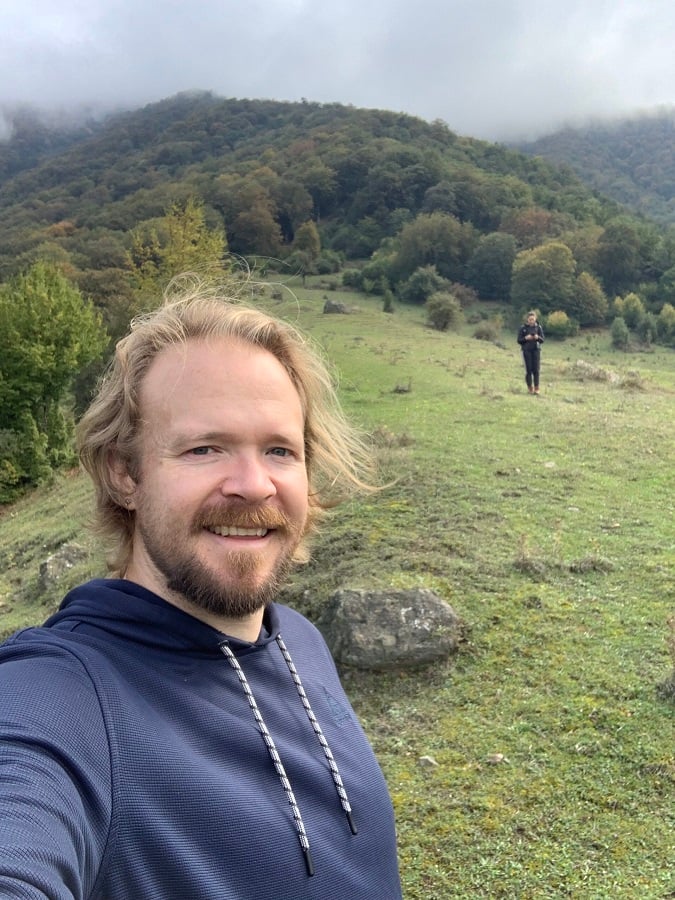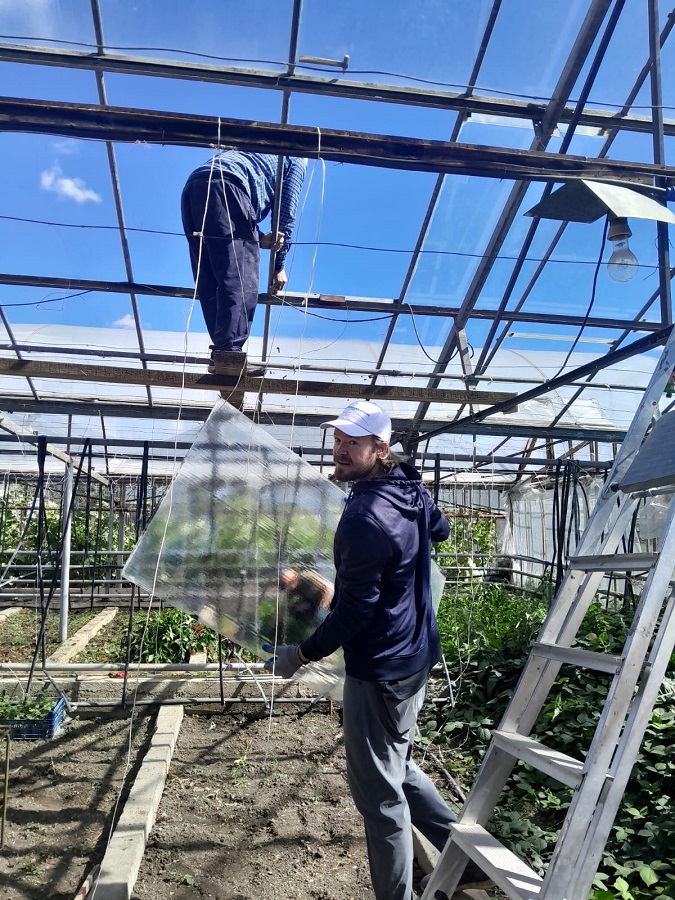The Armenian Weekly. If I had to choose one word to describe driving in rural Armenia, it would be “unregulated.” Road maintenance seems nonexistent; trees often cover potholes, serving more as traffic signifiers than attempts to improve conditions. Many Yandex and GG drivers remove passenger seatbelts, and virtually every driver zigzags past slower vehicles. Meanwhile, minibuses — also known as marshrutkas — compete to see who can fit the most commuters. The first time I got into the car with my volunteer site lead on our way to Vahagni village, I felt like I was in a high-speed chase. But I soon realized that, for him, it was just another Friday afternoon.
This chaotic drive is just one of the many experiences that have shaped my time in Armenia. All my life, I’ve wanted to live outside of the United States. If you were to ask most people I grew up with, “Where will Sean live as an adult?” the answer would likely be, “Ireland.” I fell in love with Irish culture and history as a teenager, and I let anyone who cared to listen know it. Some of this was due to my Irish heritage and having visited on three separate occasions. But despite my love for Ireland — my heritage, its history and its music — I never lived there. The only country I’ve visited more than Ireland, and the only one I’ve lived in aside from the U.S., is Armenia.
I often get asked, “Why did you move to Armenia?” especially since my family is not from here. Indeed, it’s a question I’ve asked myself, too. The first time I visited Armenia was in 2013, right after graduating from college, during a two-week student diplomacy trip that landed me in Ankara, Tbilisi and Yerevan. I came back in 2023 for a two-month-long Russian language intensive program, and again in the winter of 2024 to visit my partner, who was conducting research in Yerevan as a Fulbright recipient.
After completing a master’s program this past May, my partner decided to remain in the country as a Birthright Armenia volunteer, and I signed up to serve with the Armenian Volunteer Corps (AVC). By the time I arrived in Vanadzor, I thought I was prepared for anything. But Armenia’s unpredictability proved to be a challenge.
Read also
The most difficult aspect of living in Armenia has been the language barrier. When I lived in Yerevan in 2023, I encountered only a handful of language-related issues and was able to navigate my daily life in Russian. But since arriving in Vanadzor and dealing with Armenian bureaucracy, I’ve realized that Russian can only get me so far. In countless situations, I’ve desperately relied on my partner as interpreter. The language barrier was even more prominent at my volunteer site. As an English teacher, I faced classes where sometimes only three students would show up. Other times, no students showed up at all. On occasion, the students who did show up weren’t always eager to participate. I learned quickly that I had to improvise — adjusting lesson plans on the fly, trying to engage students who weren’t necessarily excited to learn.
I took these stressful experiences as lessons in humility. Instead of giving up, I examined ways to improve my Russian and make my lesson plans more mentally stimulating and engaging. I also learned not to take the challenges at my job sites personally. Building rapport with students outside of the classroom went a long way. For example, many of my students shared their interests with me and helped me improve my pronunciation of Russian and Armenian words.
One of the most rewarding experiences came during my first day teaching at the Matemik NGO in Vahagni village, a small community about 30 minutes northeast of Vanadzor. Vahagni is home to roaming dogs, cats, cows and pigs — a charming welcome to a village that’s also full of young students eager to learn English. I was tasked with teaching a class of eight teenagers, most of whom took English lessons three hours a week. To connect with them, I decided to focus on interactive speaking activities. I ended my first class with equal feelings of excitement and fulfillment. The next week, the students welcomed me with a sign reading, “Welcome, Dear Good Man.” It was the most endearing thing I have experienced as a teacher.
In addition to teaching English, I also volunteered twice a week with my partner at the Experimental Garden in Spitak. This was a refreshing change from my typical schedule. Instead of sitting in a classroom, I was outside, getting my hands dirty and enjoying the literal fruits of our labor. Every visit was different — some days we’d be weeding, others we’d be picking cucumbers or removing 20-year-old window panes from greenhouse frames.
Working in the garden required both mental and physical resilience, especially given the intense heat inside the greenhouses. After spending three hours pruning strawberries in the sweltering heat, I learned to take water breaks every 20 minutes to stay cool. Even when the work was exhausting, we made it fun — competing to see who could pick tomatoes the fastest or whose knot-tying skills were the best. While we didn’t know beforehand what type of work we would be engaging in, we were always sure to enjoy a hearty lunch provided by Anna and her family, who operate the garden.
While I was at least able to converse in English with my site leads, language remained a challenge. In the greenhouse, I had to rely on a mixture of Russian and Armenian to communicate, which felt like a game of linguistic survival. Nevertheless, these challenges taught me adaptability. Each day brought a new set of obstacles but also new opportunities to learn and grow.
I chose to move to Armenia because of the multiple opportunities it offers, but I am staying because of the lessons I have learned and the positive encounters I have had with students and locals. Yes, the roads are treacherous, the language barrier can be frustrating, and the schedules are often unpredictable. But these are also the realities of life in Armenia, where I’ve experienced warmness from strangers, a relaxed approach to work and the generosity of people who always make sure that I leave their homes with a full stomach. Armenia has taught me that even the most difficult experiences can be transformative, and the most rewarding moments come when you least expect them.


























































